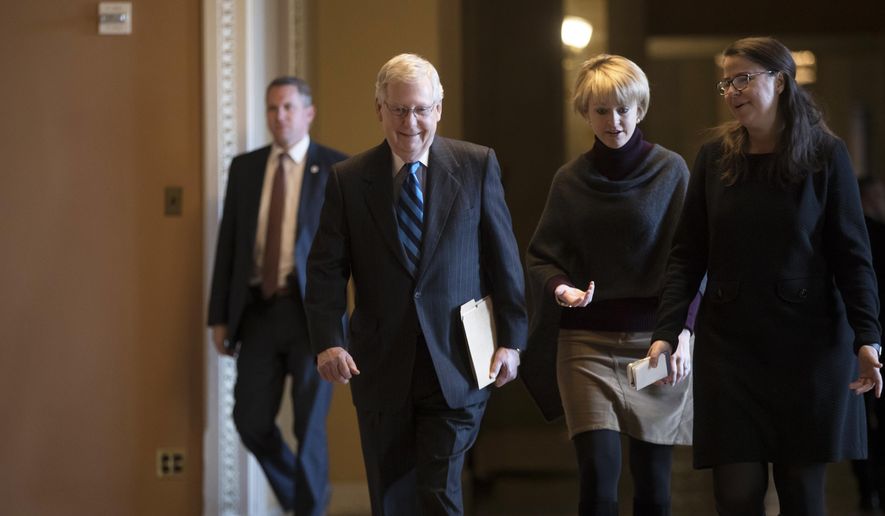Senators were reaching for a deal overnight Sunday to try to end a 2-day-old government shutdown, hoping to prevent the worst of the effects of furloughs that hits in earnest on Monday.
Republican leaders made a last-minute overture, promising to hold a broad immigration debate over the ensuing weeks, but Democrats said that still wasn’t good enough to lift their blockade and allow the government to reopen.
Another showdown vote is slated for noon on Monday.
“Talks will continue, but we have yet to reach an agreement,” said Senate Minority Leader Charles E. Schumer, New York Democrat.
But momentum was building against Democrats. Republicans — including several who had joined Democrats’ initial filibuster on Friday — said they would vote to reopen the government on Monday, saying there is a plan now to address immigration and a host of other outstanding questions, including defense spending levels.
Senate Majority Leader Mitch McConnell, Kentucky Republican, tried to push the vote up to Sunday night, hoping to end the shutdown quickly, but Mr. Schumer objected.
The government careened into a shutdown Saturday morning after Democrats led a filibuster in the Senate to block a new round of government funding.
The effects were muted over the weekend, since most federal employees who usually work on Saturdays and Sundays are already deemed essential and had to show up — albeit without the guarantee of getting paid. Monday would be the real test, as hundreds of thousands of government workers would begin a furlough.
“This shutdown’s going to get a lot worse tomorrow,” Mr. McConnell, Kentucky Republican, said as he opened the chamber for a rare Sunday session.
He said blame for the shutdown lay directly at the feet of his Democratic counterpart, Mr. Schumer of New York, who led his troops in voting against a bill to fund the government through Feb. 16. Mr. McConnell said Mr. Schumer was holding the government hostage to an illegal immigration debate that isn’t necessary for weeks.
Mr. Schumer said the shutdown happened because Republicans refused to cooperate with him.
“It was their job to reach out to us and come up with a compromise. They have failed,” he said.
The result was a shutdown all sides said they didn’t want but they stumbled into nonetheless.
For weeks, Democrats had issued demands that any spending bill would have to legalize illegal immigrant Dreamers, granting citizenship rights to perhaps millions of them. Republicans countered that any such deal would have to include more border security and changes to legal immigration policy.
Mr. Trump had said his border wall, limits to chain migration and an end of the Diversity Visa Lottery had to be part of the deal.
Sen. Lindsey Graham, South Carolina Republican, thought he had struck a deal with Sen. Richard J. Durbin, a leading Democrat from Illinois, on all four of those items, but it offered only 10 percent of the border wall and no significant cut to chain migration in exchange for a generous amnesty. Mr. Trump rejected the deal, calling it weak.
Mr. Schumer tried to resurrect the plan in a meeting with Mr. Trump on Friday, agreeing to even more wall money but refusing the other demands. Those negotiations also broke down, and Mr. Schumer said Americans would blame the president.
“This will be called the Trump shutdown,” Mr. Schumer said.
Even as the Senate was voting to filibuster, Mr. Graham was working on an exit plan. He had a bipartisan group of senators gathered around his desk, where he sold his idea to fund the government through Feb. 8 in exchange for a promise to debate immigration in coming weeks.
It took more than a day for that plan to gain traction, with a lack of trust poisoning the dialogue.
Mr. Schumer said talking with Mr. Trump was like “negotiating with Jell-O,” while congressional Republicans countered that Mr. Schumer couldn’t be relied on.
Mr. Schumer and the White House also traded accusations of misleading the public about discussions on the border wall during a Friday meeting between the Democrat and the president.
Given the frayed relations, Democrats were pushing for the stiffest possible guarantees they could get. They wanted Mr. McConnell to agree to a firm vote and had hoped to get House Republicans to follow suit.
Senate Republicans said there was no way an agreement could lock in the House, however.
“I can’t guarantee our Democratic friends a result, but I think the majority leader is willing to make a proposal I can support, which is CR to Feb. 8, taking up immigration if we don’t have a solution by then,” Mr. Graham said.
Mr. Trump’s role in future immigration negotiations is also uncertain. Republican leaders have said the president must be on board before a bill reaches the floor, but Sen. Jeff Flake, an Arizona Republican and frequent Trump critic, said that could snag talks.
“We can’t wait for the president to express support for something before we move to it in the Senate,” he said.
As the shutdown continues, Mr. Trump’s campaign team released an ad saying Democrats who oppose the president’s border security policies will be “complicit for every murder committed by illegal immigrants.”
“Build the wall. Deport criminals. Stop illegal immigration now. Democrats who stand in our way will be complicit in every murder committed by illegal immigrants,” the ad by Donald J. Trump for President said.
• Valerie Richardson contributed to this report.
• Stephen Dinan can be reached at sdinan@washingtontimes.com.
• S.A. Miller can be reached at smiller@washingtontimes.com.




Please read our comment policy before commenting.